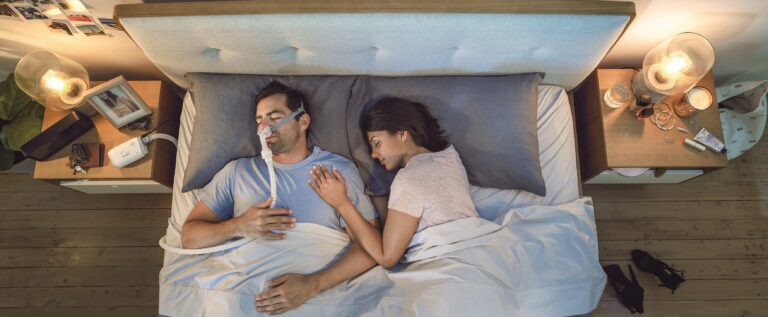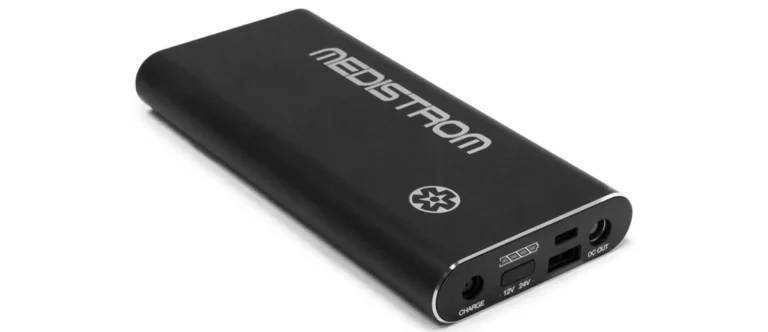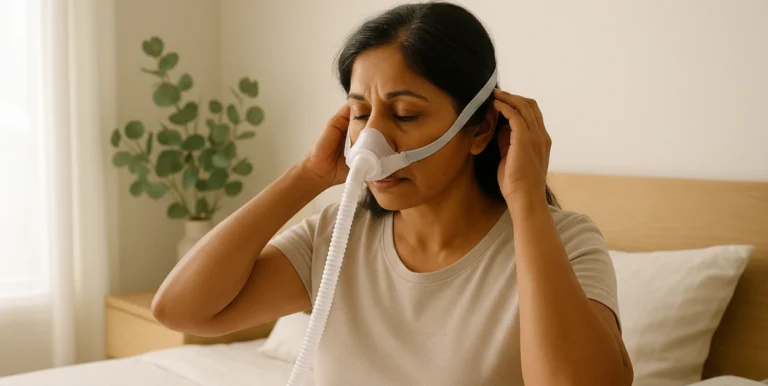Your cart is currently empty!
Prefer to just call? (07) 3472 6421
|
Do I Really Need a CPAP Machine? Signs You Shouldn’t Ignore

Waking up more tired than when your head hit the pillow isn’t just frustrating – it’s a warning sign too loud to ignore. If you’ve been wrestling with daytime fog, loud snoring, or constant fatigue, ignoring it won’t make it go away.
Maybe you’ve shrugged it off as “just being tired” or blamed stress, kids, or a snoring partner – fair enough, but what if it’s more? Living with untreated sleep apnea can quietly chip away at your focus, energy, and long-term health without a clear alarm bell.
We understand what sleepless nights can do, especially for health-conscious Aussies trying to function their best each day. That’s why we offer tailored CPAP solutions and honest advice through Sleep Warehouse – so good sleep becomes your everyday reality.
Understanding Why CPAP Might Be Needed
What CPAP Machines Are Designed to Treat
If breathing feels uneven or strained at night, there might be more going on than stress or a long day. A CPAP machine, or Continuous Positive Airway Pressure device, keeps airways open while you sleep by delivering a steady flow of air through a mask.
This is especially important for conditions like obstructive sleep apnoea, where nighttime breathing repeatedly stops and starts. Whether the blockage stems from relaxed throat muscles or another issue, CPAP helps you keep breathing without those frequent disruptions.
Warning Signs You May Need a CPAP Machine
Your partner says you snore like a freight train and gasp mid-sleep – it’s not just annoying, it could be serious. Loud, persistent snoring, choking, gasping, or stopping breathing during sleep point toward possible sleep apnoea.
If you’re dragging through the day, struggling to focus, or easily irritated, poor sleep could be the root cause. Headaches upon waking or an unusually dry mouth might also hint your overnight breathing isn’t smooth.
The Importance of Diagnosing Sleep Apnoea
Guesswork won’t fix sleep apnoea – a proper sleep study will. Whether done at home with a kit or at a lab in-clinic, a sleep test logs your breathing, heart rate, and oxygen levels overnight.
It records events like apnoeas (periods you stop breathing) and reveals whether your sleep stages are disrupted. If you’re unsure where to begin, a sleep specialist helps interpret results and recommend treatment like CPAP therapy.
Health Risks of Untreated Sleep Apnoea
Physical Health Consequences
Those skipped breaths at night aren’t harmless – they stress your body and heart more than you’d expect. Sleep apnoea raises your chances of high blood pressure, heart attack, and stroke without loud alarms to warn you.
It can also lead to insulin resistance, making type 2 diabetes more likely, especially alongside weight gain.
Over time, the combination increases your risk of serious illness that CPAP use could have reduced dramatically.
Mental & Cognitive Risks
Interrupted sleep doesn’t just exhaust your body – it rattles your mind too. Chronic fatigue from poor-quality sleep affects mood, often bringing irritability, anxiety, or low energy.
Memory grows fuzzy, emotions become harder to manage, and you may find yourself forgetful or overwhelmed. Over time, the damage to mental clarity and emotional balance becomes harder to reverse without therapy like CPAP.
Sleep Apnoea in Specific Populations
Sleep apnoea doesn’t just affect middle-aged men – it can appear in kids, teens, and older adults too. Obstructive sleep apnoea stems from airway blockage, while central apnoea involves the brain not sending signals to breathe.
Children with sleep apnoea may appear hyperactive instead of sleepy, and elderly folks may not report daytime tiredness. For those with other conditions such as asthma or chronic diseases, diagnosis and treatment must consider those extra needs.
CPAP Machines: Benefits, Challenges, and Effectiveness
Health Improvements with Consistent CPAP Use
Sticking with CPAP makes deep, restful sleep your new normal. It silences snoring, which makes life easier for your partner too.
It supports better blood pressure levels and can even assist in healthier weight control. When sleep becomes restful again, energy, moods, and clarity greatly improve.
Common CPAP Side Effects to Be Aware Of
Starting CPAP may come with hiccups. Dry mouth, pressure headaches, or stuffy sinuses sometimes appear early on.
Some feel claustrophobic with the mask or get mild skin irritation. Others experience bloating from air entering the stomach, known as aerophagia.
Managing and Adapting to CPAP Therapy
Maximising comfort makes all the difference. Choosing the right type of mask – full face, nasal, or combo – depends on how you breathe and sleep.
Adding a humidifier can help reduce dryness, and fitting your bedtime routine around the device builds habit. If you’re stuck, we’re here to guide you through every challenge so CPAP becomes second nature.
Alternatives to CPAP Therapy
When CPAP Isn’t the Best Fit
Sometimes CPAP just doesn’t click. If you find it unbearable, or your symptoms persist with proper use, it may not be the right method.
In those cases, speak with a sleep specialist to explore other treatments. We provide expert support to help review signs of failed adjustment or worsening symptoms.
Oral Appliances for Mild to Moderate Cases
Oral devices are low-key but effective for many. Mandibular advancement devices push your jaw forward gently to keep the airway open.
They shine in mild cases and for those who move often during sleep. These are quiet, packable, and often more comfortable, making them a good pick when CPAP isn’t ideal.
Other Emerging and Lifestyle-Based Treatments
Small changes make a big impact. Weight loss and regular exercise ease pressure on the airway and reduce breathing interruptions.
Avoiding alcohol before bed and changing sleep positions can bring improvements too. We also stay updated on newer treatments and tech that might one day offer new options.
Choosing and Maintaining Your CPAP Device
Selecting the Right Machine and Mask
The perfect CPAP setup fits your needs and preferences. Some may benefit from APAP’s automatic pressure changes, while others need BiPAP for variable pressures.
We stock full-face masks, nasal options, and combo styles – each suited to different breathing habits. Our expert team helps you choose based on how you sleep and what keeps you most comfortable.
Maintenance and Hygiene Essentials
Clean gear is vital. Using CPAP cleaning wipes or gentle soap daily keeps bacteria away and extends your machine’s life.
We recommend changing filters monthly and checking for worn-out parts. Use mask liners and humidification safely to prevent dryness or skin reactions.
Travel and Power Options
Travelling with CPAP is easy with the right tools. We offer compact, battery-powered units ideal for long flights or remote areas.
You can add backup batteries for peace of mind during power cuts. Planning ahead keeps your therapy consistent, no matter where you are.
FAQs
How do you know if you really need a CPAP machine?
If you snore loudly, gasp at night, or feel overly tired during the day even after sleep, you might need CPAP. A sleep study confirms this.
Can untreated sleep apnoea be fatal?
Yes. Severe cases may lead to heart disease, stroke, or accidents due to extreme fatigue, especially when driving or working.
What’s the difference between CPAP, BiPAP, and APAP?
CPAP gives constant air pressure. BiPAP offers two pressures for inhale and exhale. APAP adjusts pressure automatically during sleep.
How long do CPAP machines usually last?
Most CPAP machines last 3 to 5 years with proper care. Regular maintenance helps extend device life.
Are there effective new CPAP machines without masks?
Some devices are in development, but currently, mask-free CPAP isn’t widely available or as effective. A mask remains standard.
How long do you need to use a CPAP before noticing a difference?
Many feel better within days, though full benefits may take a few weeks of regular use. Consistency speeds up results.
What lifestyle changes can support or reduce reliance on CPAP therapy?
Losing weight, exercising, and avoiding alcohol at night can ease symptoms and may reduce pressure needs or device dependency.
What if CPAP isn’t working anymore – should the diagnosis be revisited?
Yes. If symptoms return or worsen, another sleep study may be needed. Contact us or your sleep specialist for help.
Waking Up Tired Feels Normal: Until It Doesn’t
Your body knows when something’s off. You’ve pushed through yawns, blamed it on stress, and made peace with morning fog. But deep down, you know this isn’t just tiredness; it’s exhaustion that never ends.
If you wake up gasping, snore heavily, or drag through your day no matter how early you sleep, it’s time to stop guessing. Paying attention now could be the sleep reset your body’s been begging for.
At Sleep Warehouse, we help Australians recognise the signs, find answers, and sleep easier with the right CPAP solutions. Chat with us today – your best sleep could be closer than you think.
ABOUT AUTHOR



Leave a Reply
You must be logged in to post a comment.